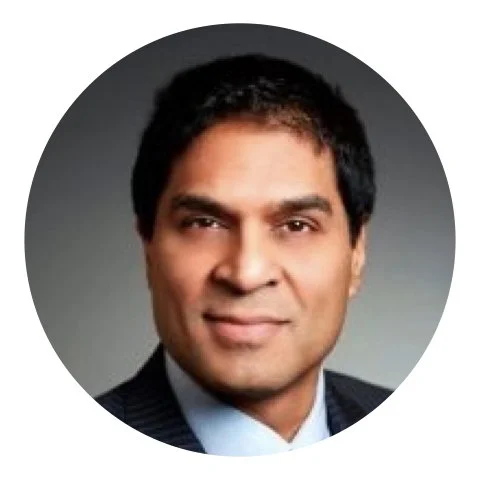
Av Maharaj drives leadership and innovation at The Kraft Heinz Company
Maharaj reveals how the legal department is navigating headwinds and supporting business growth
By Lucy Saddleton, Managing Editor, ADB Insights
During his time as a legal leader at The Kraft Heinz Company, Av Maharaj has worn many hats, extending his reach far beyond the legal realm and into other areas of the business-focused organization. Not only has he helmed the corporate affairs, CSR and government relations divisions for the food and beverage giant, but he has also run the human resources department, and the regulatory team.
Maharaj sat down with The Legal Innovation Forum’s founder and CEO Andrew Bowyer for an in-depth conversation about his career path, leadership priorities, and strategies for addressing challenges and supporting the company's business goals to drive change at Kraft Heinz. Tune in to our podcast to hear the full interview.
When he first made the decision to move from private practice to an in-house role, Maharaj set his sights on joining a large organization with a recognized household brand. The Kellogg Company fit the bill. After leading the legal department at Kellogg for 10 years, he did a brief stint in private practice before returning to the newly amalgamated operations of Kraft Heinz Canada in 2016 to continue exploring his passion for combining business and the law.
Kraft Heinz CEO of Canadian business Simon Laroche has said that “disruptive innovation” is a key tenet of the company’s strategy. Maharaj is a strong supporter of this approach, noting that adding value goes beyond simply knowing the business.
Av Maharaj, VP legal + corporate affairs
The Kraft Heinz Company
“A business is a leaky bucket,” said Maharaj. “If you don’t continue filling the top of the bucket with breakthrough innovation, the bucket’s going to go dry.
“You need to think about how you convert legal from a cost centre to an organization that is improving the bottom line - not just blocking and tackling, but are you doing something innovative yourself?” he added. This may involve looking at contracts differently to save the company money, or thinking of new ways to improve the lives of employees or reduce the environmental impact, for example. With full oversight of the entire business, legal is well-positioned to lead in these areas, Maharaj said.
One of the key challenges currently facing consumer packaged goods companies like Kraft Heinz is the shifting consumer mindset regarding which foods are considered healthy, together with a general increase in food literacy and health awareness, said Maharaj, who holds the title of VP, legal and corporate affairs at Kraft Heinz.
“People want things like clean labels and simple ingredients. There is a push towards a much more holistic view of food,” said Maharaj. The rise of niche food products in the past 10-to-15 years has put pressure on large manufacturers, he noted.
“Consumers are looking for differentiation; that product that really suits their particular needs, and so there are lots of opportunities for niche players to come up,” Maharaj said. “Large companies have to face that challenge. You’re not dealing with another large company that’s trying to steal your lunch, but rather there are a thousand little companies that are out there trying to figure out that ideal niche that they can play in and then go after that segment.”
Like many manufacturers, Kraft Heinz was impacted by post-pandemic supply-chain issues when items such as glass jars, vitamin C and mustard seeds became hard to find. Shipping containers tripled in price, causing a significant spike in inflation, creating another challenge for consumer packaged goods companies.
Kraft Heinz is committed to keeping price increases below inflation levels, Maharaj said.
He also noted that the company navigates ongoing supply chain issues by manufacturing most of its products in Canada for the Canadian market. For example, Heinz Ketchup - which was produced outside of the country for five years - is now produced in Canada.
“We saw the demand for ketchup increasing so we made the call to return the production back to Canada,” said Maharaj.
Negotiating supply chain agreements with external partners has become more challenging for the legal team amid rising prices and demands, so the legal team must be mindful of preparing well in advance, and leveraging experience across the organization to fully understand the contingencies and add value to negotiations. While unexpected inflation and business consequences make it challenging to predict if price rises will be transitory or permanent, legal leaders are adept at seeing across the entire organization and adding insights accordingly, Maharaj said.
“The people in our business - and most businesses - need to learn a new set of skills about how to take price increases and be more strategic…Consumers are having a tough time out there. How can we help them if this is transitory? Can we figure out ways of getting through this and maybe ending up with a competitive advantage because our prices are going to be lower, and still keep the business whole?”
Reputational risk and ESG are also significant risks for large organizations like Kraft Heinz. Public affairs is a critical element of protecting the reputation of a large organization amid endless social media chatter and citizen publishers.
With regard to ESG, not only is it the right path to follow from a corporate responsibility point of view, but it also makes sense from a business perspective, Maharaj said, as it can actually help the bottom line. Encouraging business leaders to start thinking about ESG as a competitive advantage can offer a real tailwind for ESG, he said.
“We in the legal group - and people that are managing ESG - need to start talking about ESG differently and they need to start talking in the language of business much better,” said Maharaj.
Subscribe to the Legal Innovation Forum’s podcast series to hear from Av Maharaj and other legal leaders in North America.


